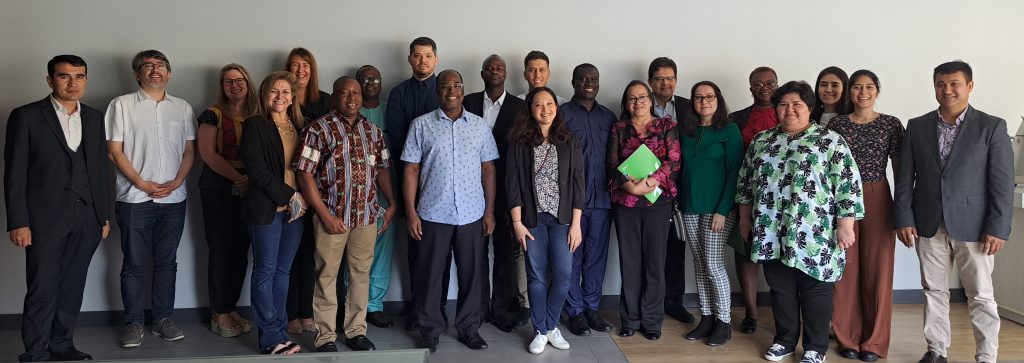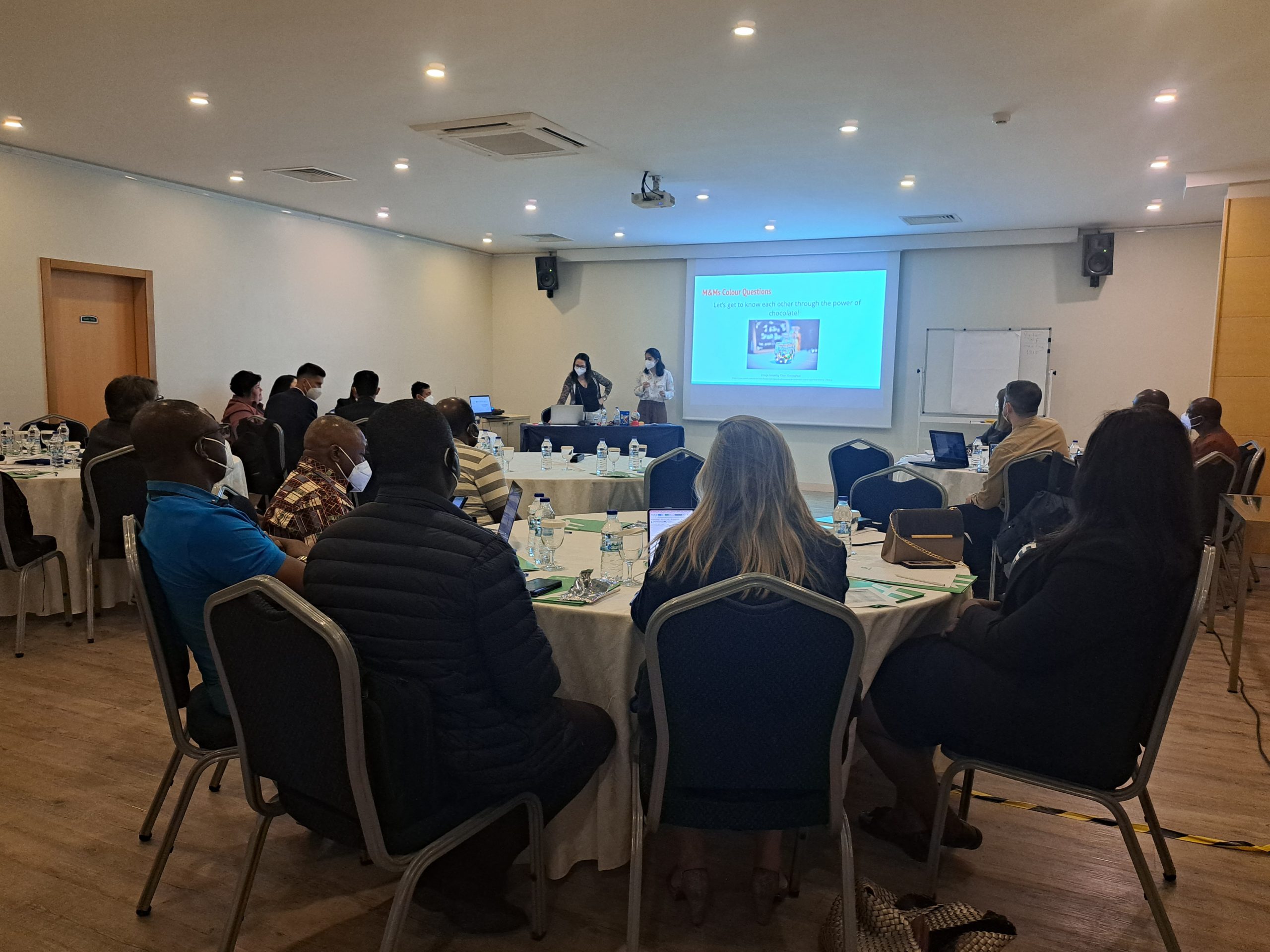By Barbara Conde-Gafaro, Research Assistant
The global research team, alongside the local teams of Ghana, Honduras, and Uzbekistan (PIIMA and Avloniy), gathered for the first time since the beginning of the TPD@Scale project in 2020. The face-to-face meeting included various sessions, and activities that took place from September 27-29, 2022, in Istanbul, Turkey.
The key objectives of this three-day event were:
- To collectively reflect on how the TPD@Scale model has been interpreted, implemented, and assessed in each national setting. (Drawing on the evidence that is being generated and paying attention to the implications for equity, quality, and efficiency.)
- To contribute to a framework for governments (policymakers, stakeholders, etc.) which highlights the implications of this collaborative effort to generate a change in how local actors understand, implement, and assess local @scale TPD systems.
- Each country team to create a detailed action plan for interactions with appropriate country stakeholders to support them to draw on this evidence in the design, development, implementation, evaluation, and continuous improvement of TPD@Scale for diverse contexts and teacher subgroups.
The first day of the event started with an ice-breaker activity, followed by country team presentations on their model and experiences of different teachers with the TPD@Scale model. Each country team took notes and completed a comparative table of the information from the four presentations: Honduras, Uzbekistan: Avloniy, Ghana and Uzbekistan: PIIMA. This was followed by a discussion on the
After a short break, the discussion continued based on the similarities and differences among the models implemented in each country. The day ended with a plenary session where members had the opportunity to discuss what they had learned from each country team and critically reflect on the elements of equity, personalisation, efficiency, assessment, and scaling issues. The sessions on the first day helped the group comprehend and analyse how the three local teams operationalised the TPD@Scale model in their countries.
On the second day of the event, the Ghana and Honduras technical advisers led a thought-provoking discussion around one of the core principals in the TPD@Scale model. The session, “Developing the TPD@Scale Framework: Thinking about quality” aimed to discuss the conceptualisation of quality, identify and show evidence of quality aspects within the models implemented in each project country, and comment on how local teams were fostering quality in their TPD models.
The following session on another core principle in the model, “Developing the TPD@Scale Framework: Adaptation for equity at scale,” led by the principal Investigator Freda Wolfenden, reminded the project members that adaptation can occur at different levels: system, district, tutor/mentor, and teachers. Freda Wolfenden added that “scale is not about homogenous provision for large numbers; scale is about adapting for different groups, considering different contexts and needs of teachers.”
Considering the importance of acknowledging those differences and ensuring that equal opportunities are provided for teachers so that they can fully participate in TPD courses, each project team discussed the following questions during that session:
- What factors need to be considered for equity in TPD@Scale in your context?
- What recommendations would you give to key stakeholders about the adaptations that need to be made to the TPD models for scaling with equity?
- What evidence will you use to support your recommendations?
- What might need to be in place to enable scaling with equity?
Following the session on equity was a session on the final core principle of the model, “Developing the TPD@Scale Framework: Efficiency.” The project lead in Honduras, Rosa María Moncada, presented the costing tool they used for finding that optimal balance between cost, participation, and educational quality during the TPD course programme. Her presentation led to a discussion about potential recommendations each country team would share with key stakeholders so that TPD models can be adapted and scaled efficiently in their countries, while maintaining or enhancing quality and equity.
At the end of this second day, team members started to build the country action plan: outcomes, outputs, and stakeholders, considering the KIX Results Framework and the analysis of a scaling case study. The sessions on Day 2 helped team members to think of the relevance of quality, equity, and efficiency within TPD@Scale and how these concepts can inform decision-making processes that can generate a change in how local actors understand, adapt, and assess TPD systems in their countries.
On the last day of the global meeting, the principal investigator shared the research questions and prompted team members to think of what they needed to do with the data generated so far to answer those questions. Country teams were given reminders on key reporting dates.
Then, the research assistants of the project, Ernesto Gutierrez, Barbara Conde Gafaro and Ibrahima Diallo, ran a session on, “Analysing data from social media – what can we learn?” It was an opportunity to introduce ‘WhatsAnalyze’, an open-access tool for chat data analysis. Project members in Honduras, Ghana and Uzbekistan discussed how they could analyse chat data using that tool and its features.
Reaching the end of the event, a member of the global team, Mohammed Dawuda, presented a summary of the results achieved by each country team based on the MEL progress markers. These results prompted participants to continue working on the country’s action plans for outputs, stakeholder engagement and project dissemination. Each country team presented their action plans to the other team members, who provided feedback on their timeline and strategies to meet their deadlines. A reflection activity took place afterwards as a closure of the event.
Overall, the sessions on Day 3 and the previous activities on Day 1 and Day 2 of this global meeting comprised helpful and much-needed discussions to embark on the last stages of the TPD@Scale project.
The project outputs will be submitted to IDRC by 31st of January 2023.



49 Responses
It’s really a nice and useful piece of info. I’m glad that you shared this helpful info with us. Please stay us up to date like this. Thanks for sharing.
Hi, yes this piece of writing is actually fastidious and I have learned lot of things from it about blogging.thanks.
F*ckin’ awesome issues here. I’m very satisfied to peer your article. Thanks so much and i’m looking ahead to contact you. Will you please drop me a mail?
It’s an remarkable piece of writing for all the online people;they will get advantage from it I am sure.
I appreciate you sharing this post. Cool.
Very informative blog article.Really looking forward to read more. Keep writing.
Say, you got a nice article.Thanks Again. Much obliged.
Enjoyed this update, is there any way I can get an update sent in an email every time you publish a fresh post?
I loved your blog article.Much thanks again. Keep writing.
Greetings! Very useful advice in this particular article!It is the little changes that produce the greatest changes.Thanks a lot for sharing!
That is a very good tip particularly to those new to the blogosphere. Brief but very precise info… Thanks for sharing this one. A must read post!
It is actually a nice and helpful piece of info. I’m glad that you shared this useful information with us.Please keep us up to date like this. Thanks for sharing.my blog; Caylan Ford
hydroxychloroquine sulfate side effects chloroquine diphosphate hydroxychloroquine risks
Appreciate you sharing, great blog article.Thanks Again. Really Great.
I really enjoy the blog article.Thanks Again. Really Cool.
Wow, great blog article.Really looking forward to read more. Much obliged.
I value the article.Really looking forward to read more. Will read on…
I value the article post.Much thanks again. Cool.
Major thanks for the post.Really thank you! Cool.
Muchos Gracias for your blog article.Thanks Again. Really Cool.
Great, thanks for sharing this article post.Really looking forward to read more. Fantastic.
Thank you ever so for you blog post. Awesome.
Im thankful for the post.Really thank you! Much obliged.
Really enjoyed this blog.Thanks Again.
Really enjoyed this blog post.Really looking forward to read more. Much obliged.
Really appreciate you sharing this article. Keep writing.
Thanks a lot for the blog. Will read on…
Very good article.Really thank you! Fantastic.
Thanks so much for the article post.Thanks Again. Much obliged.
Im obliged for the article post.
This is one awesome blog article.Much thanks again. Much obliged.
I appreciate the authenticity and vulnerability you bring to your writing.
Your blog serves as a reminder to live life to the fullest and embrace new experiences.
Thanks again for the article.Thanks Again. Will read on…
I really like and appreciate your blog.Much thanks again. Really Great.
Enjoyed every bit of your blog. Want more.
This is one awesome article.Much thanks again. Really Great.
Very good article.Thanks Again.
Great, thanks for sharing this article post.Really looking forward to read more. Will read on…
Really enjoyed this article.Really thank you! Great.
Great post.Thanks Again. Will read on…
A round of applause for your article post.Really thank you! Great.
A round of applause for your article.Really thank you! Cool.
wow, awesome post. Will read on…
Muchos Gracias for your article post.Much thanks again. Great.
Great blog.Really thank you!
Enjoyed every bit of your article post.Really looking forward to read more. Great.
Thanks for the post. Really Great.
Muchos Gracias for your post.Really looking forward to read more. Will read on…